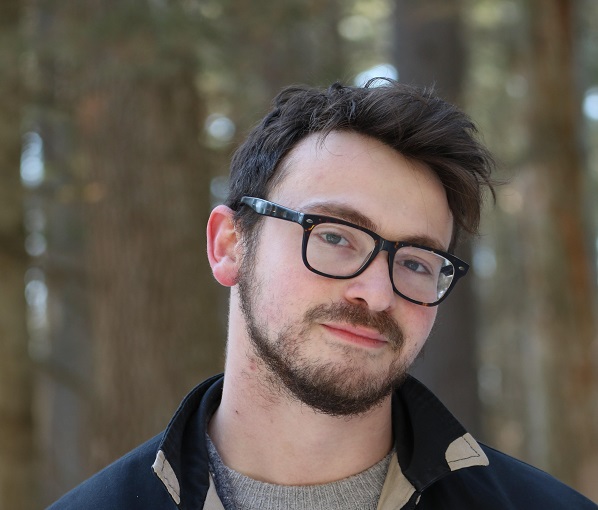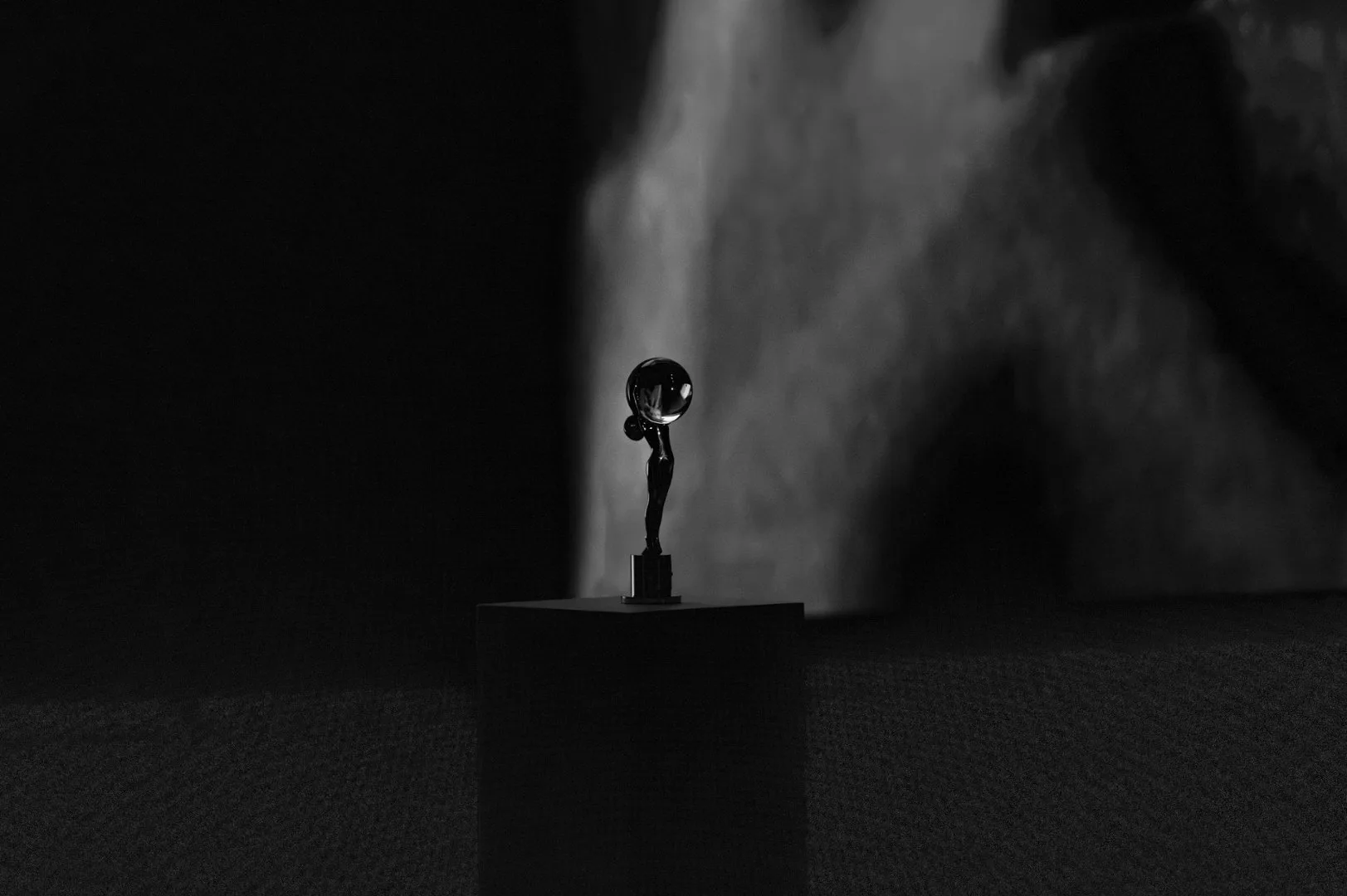Experiencing it for the first time during its 59th edition, the Karlovy Vary International Film Festival proved—at least for this critic—both formidable and revitalizing. The same can be said for the very best of the films that screened all week long in this scenic spa town in the Czech Republic. Still, there was ample energy to be harnessed even outside of the movies, from goings-on about town to Karlovy Vary’s blend of awe-inspiring architecture and natural splendor.
That thousands of spectators descended each day on the historic city centre, between pop-up tents and colonnades, never quite disrupted the town’s idyllic qualities. However, one can imagine that Karlovy Vary feels very different—less lively, more lulling—outside of the festival. Going to see films each day between the Grandhotel Pupp and the Hotel Thermal, walking riverside beneath vibrant facades of various spas, restaurants, and hotels, I often encountered groups of passerby queued up to sample mineral waters from the city’s springs, alongside others in line to secure free glasses of Prosecco or mugs of Pilsner Urquell that festival sponsors kept flowing. So ubiquitous is the latter around Prague that it’s cheaper here to drink beer than bottled water.
Coinciding with the end of the school year, the festival attracted an energetic crowd of students from throughout Europe, who see Karlovy Vary as an ideal destination to see films, catch up with friends, and party around town—often all in one evening, which accounts for why an ambient buzz of activity subsisted long into the night, every night. Scores of young attendees took advantage of this summer atmosphere and pitched campsites in a designated “tent city” area not far from the promenade. Most of them spent more time watching films than sleeping under the open sky; the day breaks early in Karlovy Vary, and birds had started singing by the time most of these cinephiles returned from late-night showtimes to recharge their batteries.
Each day, ticket offices drew lines that stretched back hundreds of meters; some slept in line to improve their odds. Not all of the cinemas showing films around Karlovy Vary are as sprawling as the 1131-seat Grand Hall in the Hotel Thermal; indeed, three venues in another area of the hotel, which also host press screenings, all seat between 63 to 70, and the hillside Husovka Theatre, a short climb away from the city centre, seats 96 adjacent to a snug outdoor bar. There’s a charming makeshift quality to such venues, all of Karlovy Vary making whatever modifications necessary to amplify the communal enthusiasm for cinema that enlivens this festival.
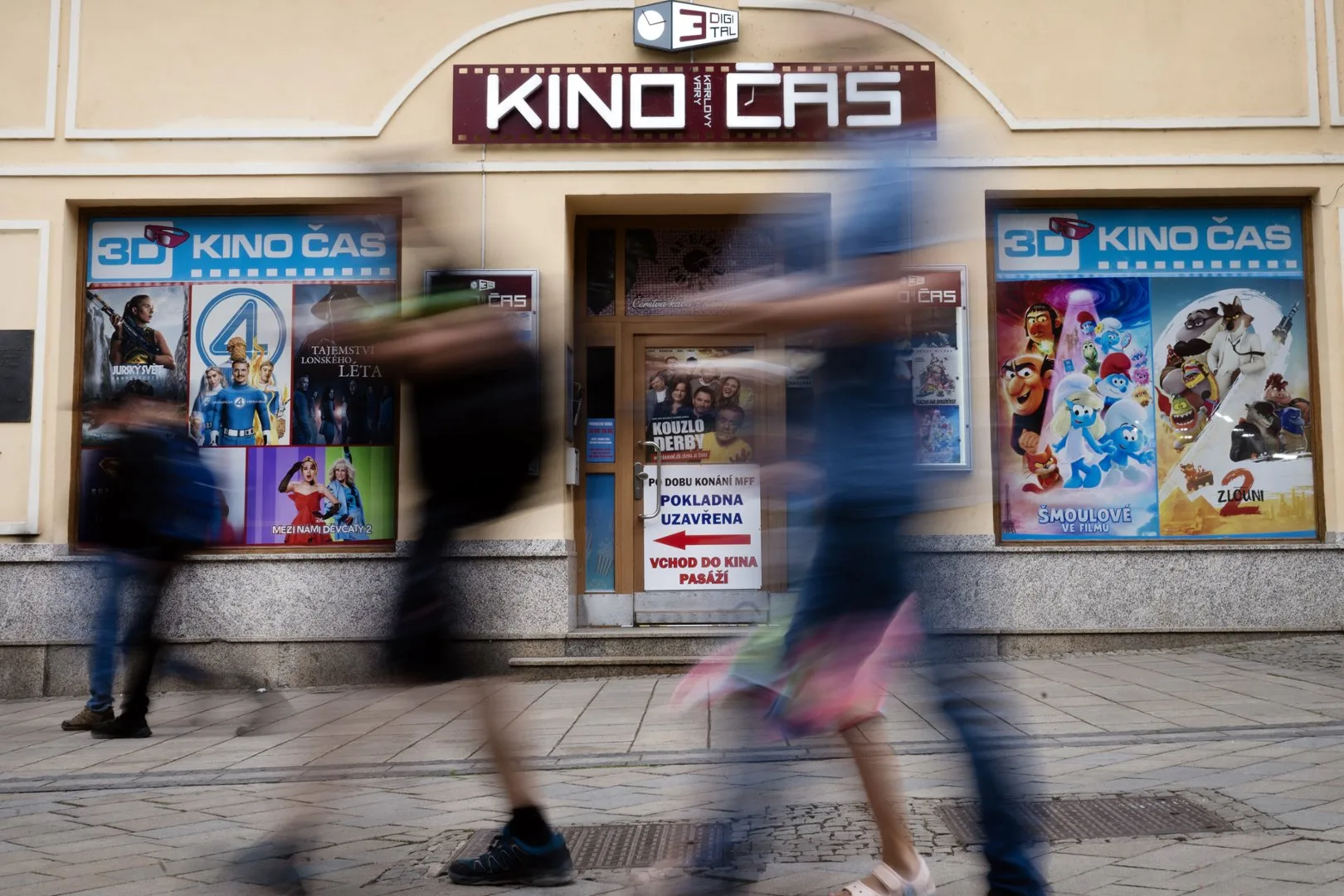
At Karlovy Vary, Celebrating Film In All Its Forms
As a newcomer to Karlovy Vary, it was striking to experience excitement on the ground for film in all forms—not just Cannes-premiered awards contenders, like Joachim Trier’s “Sentimental Value” and Jafar Panahi’s “It Was Just an Accident,” or starry retrospectives like “One Flew Over the Cuckoo’s Nest,” presented by producer Michael Douglas and co-producer Paul Zaentz on its 50th anniversary. Here, boundary-pushing works in the Imagina section, from Mark Jenkin’s “I Saw God’s Face in the Jet Trail” to Ondřej Vavrečka’s “1+1+1” (on Super 8 and 16mm, respectively), animated as many discussions as titles in Pragueshorts and the films in Afterhours (a midnight section where 4K restorations of “The Texas Chain-Saw Massacre” and “Hellraiser” screened alongside the likes of “Dangerous Animals”). Others told me they had been devoting their time to watching the works of American actor John Garfield, ten of which were presented in a festival sidebar. (“It’s a pure masterpiece,” one critic raved to me of “Body and Soul,” a chiaroscuro boxing drama of bloody noses and punch-drunk fatalism that Garfield made with Robert Rossen.)
Over 130 films screened during the festival, which has accrued a reputation as a “programmer’s festival” in that it brings together breakout titles from Cannes, Berlin, Sundance, Venice, and more to showcase a veritable cream of the crop. For critics and film-industry professionals alike, it’s an invaluable opportunity to catch up.
Outside of competition titles reviewed in the previous dispatches, I was most enthralled by “Dreams (Sex Love),” the Golden Bear winner at Berlin this year. From Norwegian director Dag Johan Haugerud, who has made two other films that form a thematic trilogy, this electrifying and elastic ode to the creative process follows a teenager whose hopeless crush on a teacher compels her to spill everything she has experienced into a novella. With her writing related in voiceover narration, truth blurs with fiction, and the reality of what happened is left up to a growing number of readers. While others debate the nature of the heartache she expresses in lyrical prose, “Dreams” reflects on the meaning we create from memories as we make art that turns them into something else entirely.
From Ira Sachs, “Peter Hujar’s Day,” which I’d missed at Sundance, similarly draws seismic emotion from a monologue, as the renowned photographer (Ben Whishaw) tells his friend, the journalist Linda Rosenkrantz (Rebecca Hall), about the previous day’s events. Mundane and contained though it was, Hujar’s remembrance of one day in 1970s New York becomes an exhumation of that time and place, the people who moved through it, and his own role in their passage: observing, recounting, preserving.
Another kind of memorial is Akinola Davies’ debut “My Father’s Shadow,” which relives a day in 1990s Lagos through the eyes of two young brothers (Chibuike Marvellous Egbo, Godwin Egbo) finally getting to know the father (Sope Dirisu) they’re about to lose; it’s a gorgeous, mournful gesture of a film, like a handprint that lingers on skin, reflecting as “Aftersun” did on dynamics of absence and presence in all the agonized, unfinished relationships we share with our fathers.
Hlynur Pálmason’s “The Love That Remains” similarly sees filmmaking as sculpture, and time as its raw clay; working with immediate surroundings, the Icelandic filmmaker cast his children in this tragicomic portrait of a family coming apart, resulting in a film—shot piecemeal over years—that’s as loosely structured as it is precisely composed, with some of the strangest images anywhere at the festival.
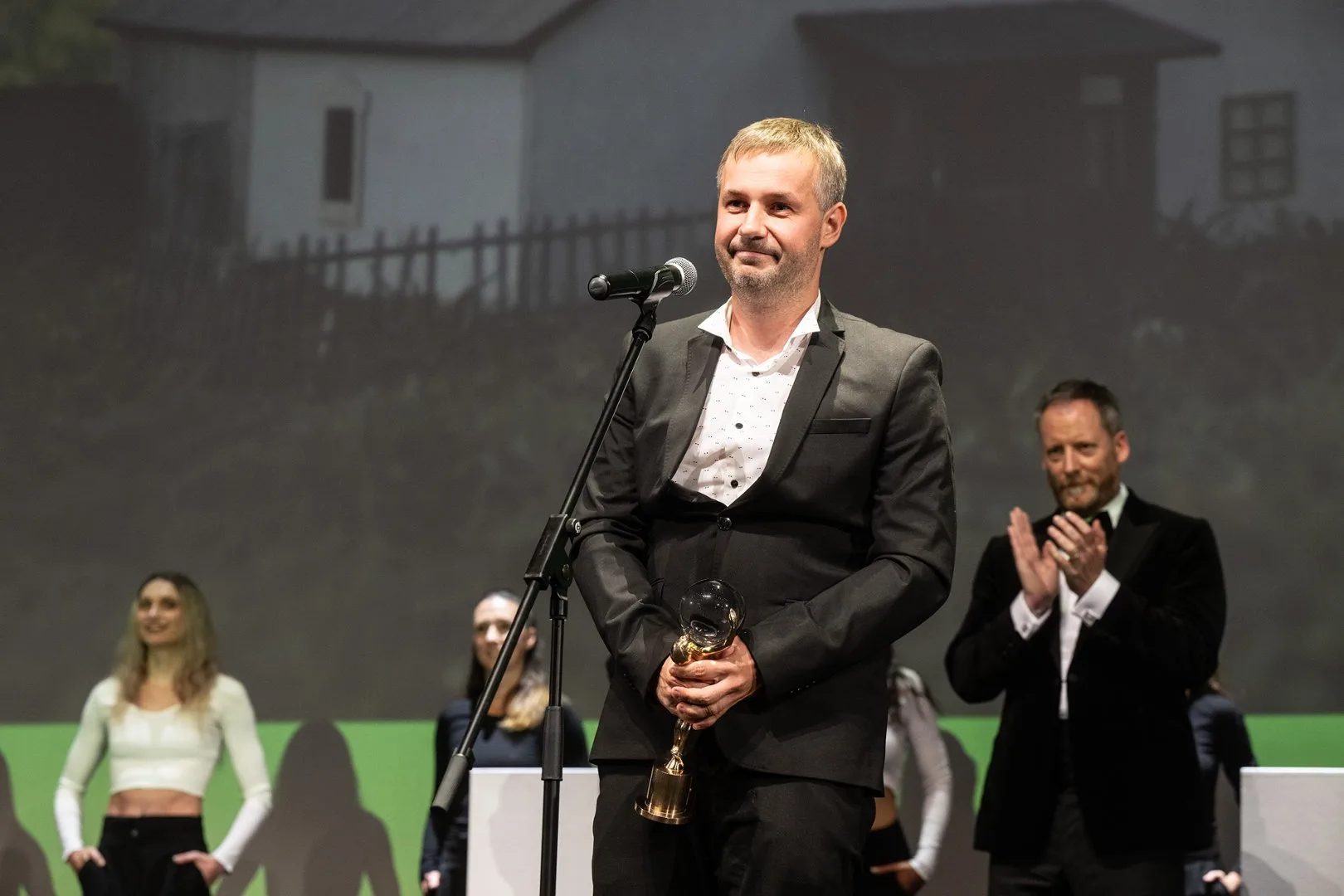
“Better Go Mad in the Wild,” “Sand City” Triumph at Karlovy Vary’s Awards Ceremony
Films competing for the Crystal Globe premiered across the week, and the ultimate winner only screened in the festival’s final days. As announced during the festival’s Saturday-night closing ceremony, Slovak filmmaker Miro Remo’s charming docufiction hybrid “Better Go Mad in the Wild,” about two eccentrics in their sixties living in the forests of Sumava, won the section’s Grand Prix, becoming the first homegrown title to earn top honors at the fest in eight years.
Jurors Nicolas Celis, Babak Jalali, Jessica Kiang, Jiří Mádl and Tuva Novotny said in their jury statement that Remo’s “delightfully inventive documentary” doubled as “a funny valentine to the fading art of being true to yourself,” adding, “‘Better Go Mad in the Wild’ feels like a gulp of fresh, woody air, or a quick dip in an outdoor pond, or a moment of contemplation as a cow chews on your beard. In short, it feels like being free.” On stage, joked Remo, “If I knew it would be such a huge event, I would have worn a bowtie.”
A special jury prize, meanwhile, was awarded to “Bidad,” Soheil Beiraghi’s account of a Gen Z singer’s one-woman resistance to Iranian authority. “I thank Iranian women for not being afraid; they taught me not to be afraid,” he said through a translator. “They don’t need to be pitied — they need to be applauded,” he added, prompting a standing ovation. In a surprise twist, the jury split their best-director prize between 33-year-old Lithuanian director Vytautas Katkus for “The Visitor” and 25-year-old French director Nathan Ambrosioni for “Out of Love,” honoring two films “that represent opposite ends of the spectrum in approach yet are each, individually, deeply impressive directorial statements,” per their statement.
Norwegian actress Pia Tjelta took home best actress for “Don’t Call Me Mama,” about a teacher who has an affair with one of the refugees she mentors at a local asylum centre, while Spanish actor Àlex Brendemühl won best actor for “When a River Becomes the Sea,” in which he plays the stoic father of a woman recovering from sexual assault. A special jury mention was awarded to Czech newcomer Kateřina Falbrová, who was first cast in “Broken Voices” at age 12, in the role of a singer preyed upon by her choirmaster. Finally, the Právo Audience Award went to “We’ve Got to Frame It! (a conversation with Jiří Bartoška in July 2021),” the festival’s opening title.
Jurors for the Proxima sidebar section included Yulia Evina Bhara, Noaz Deshe, Nelson Carlos De Los Santos Arias and Marissa Frobes. In Proxima, the Grand Prix winner was “Sand City,” a visually striking tone poem set in the city of Dhaka, by first-time Bangladeshi feature filmmaker Mahde Hasan, while the special jury prize was awarded to “Forensics,” by Federico Atehortúa Arteaga, which uncovers connections between stories of the disappeared in Colombia. Special mention was awarded to Manoël Dupont’s “Before / After,” from Belgium, about two men who bond over their receding hairlines while traveling to Istanbul to visit a hair-transplant clinic there.
At the ceremony, Stellan Skarsgård—star of “Sentimental Value,” which he discussed with RogerEbert.com—was also presented with the Crystal Globe for Outstanding Contribution to World Cinema. “I’m not dead yet,” he joked on stage. “I thought I was too young for this.” Another milestone moment came as the festival bestowed a KVIFF President’s Award on the legendary Czech editor Jiří Brožek—its first such recognition for an editor. Earlier in the week, the festival had him introduce a screening of Karel Kachyňa’s “The Death of the Beautiful Deer,” a Czech classic, in the historic Karlovy Vary Theatre.
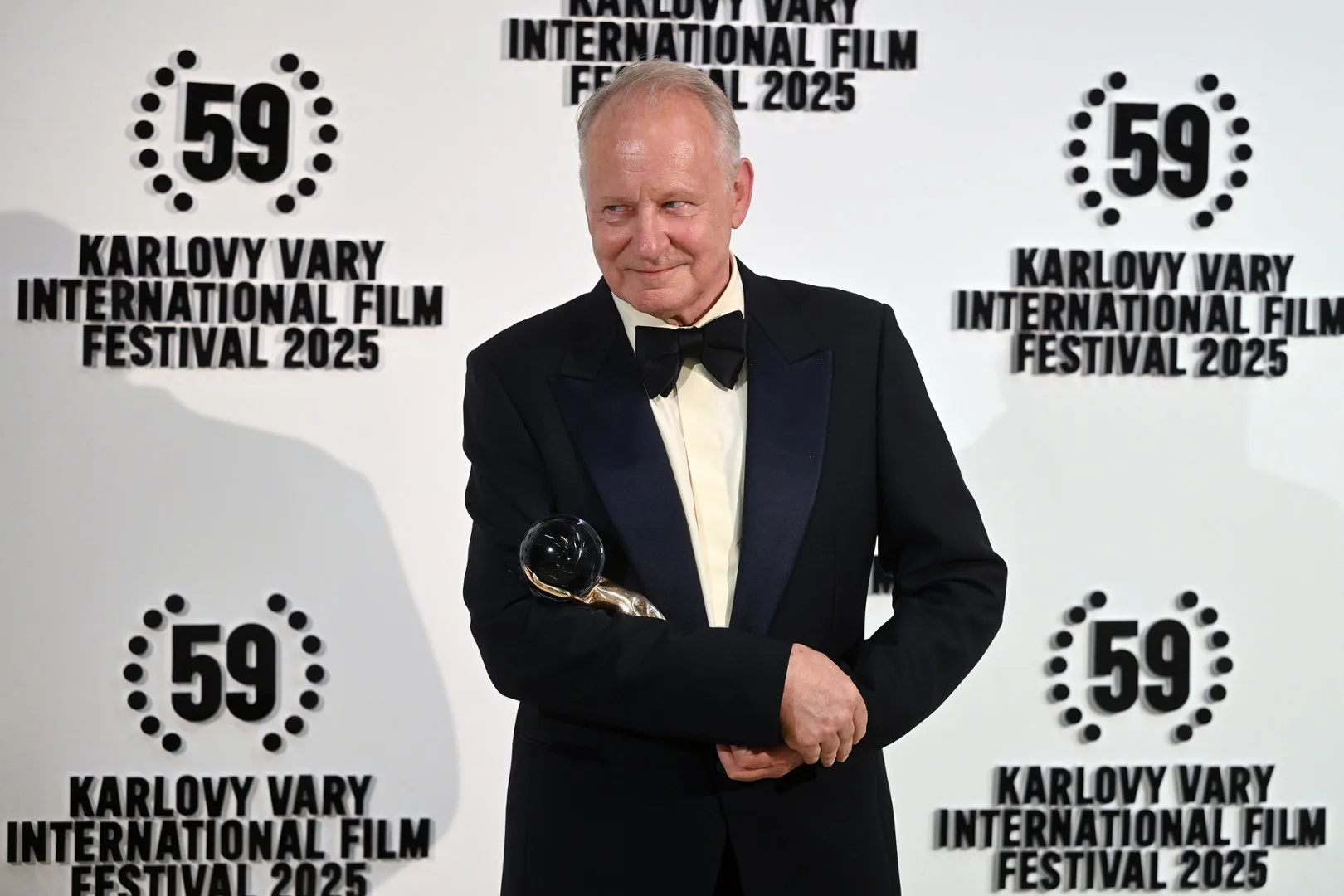
Dancing with Ghosts, as KVIFF Comes to a Close
After one final screening of Jay Duplass comedy “The Baltimorons,” the closing-night party got going an hour before midnight, as the halls of the Grandhotel Pupp turned into a free-for-all of food, drink, and festivity. Members of the juries, sworn to secrecy during deliberations, could finally cut loose amid a sea of stars. A downstairs dancefloor at the intimate Bechers Bar—a late-night VIP haunt throughout the week, though all of its tables were exclusively reserved this year for sponsors who largely left them unoccupied, making for a curious visual most nights of the festival—filled up as the night went on, reaching peak capacity around four in the morning.
Empty chairs at empty tables, in another context, reflected Karlovy Vary’s overarching tribute to Jirí Bartoska, its late president, whose death in May hung heavy over the festival. Since 2008, KVIFF screenings have all been prefaced by cinematic trailers featuring past laureates of the festival’s major awards. Czech actor Bolek Polívka appeared in this year’s film, in which Polívka—a long-time friend of Bartoska—sits at a table in a bar and orders whiskeys for himself and an unseen acquaintance. As the camera turns, the audience realizes nobody is sitting across from him, and that Polívka is addressing the late Bartoska, sliding a photograph of the actor across the table and telling him, “to hang it up somewhere, there.” At the closing-night ceremony, Bartoska’s remembrance was met with sustained applause; many were seen wiping away tears.
In a tragic turn of events, hours after “Better Go Mad in the Wild” won the Grand Prix—Crystal Globe in Karlovy Vary, one of its two subjects—Czech poet František Klišík—was found dead in a pond in the Czech village of Ohrobec, where he’d been celebrating the film’s success. Klišík’s death is still under investigation, but word of his unexpected passing at 62 reached Remo as he returned home the next day, still buzzing from victory. In a public statement addressed to Klišík, a grief-stricken Remo turned to his subject’s words, from one of the poems that featured in their film: “Life is a momentary illusion, a cry into silence, a foolish effort, a cup forced upon you, a sip of delicious taste, a prerequisite for death, which then is our certainty, a prerequisite for life.”
It’s hard to know what to say about a celebration like Karlovy Vary concluding with such stark and successive notes of legacy and loss, other than that reminders were everywhere this week of the role cinema plays in helping us make sense of mortality. At its best, the projector’s flickering light can immortalize; its pictures of ghosts make the past present once more. Paying tribute to a late luminary who made the festival what it is today, Karlovy Vary looked back even as programmers trained their gaze forward, making for a headlong rush of a festival in which it was nevertheless easy to feel suspended in time: savoring every second at the end of one era, caught between gratitude and heartbreak at the onset of another.
